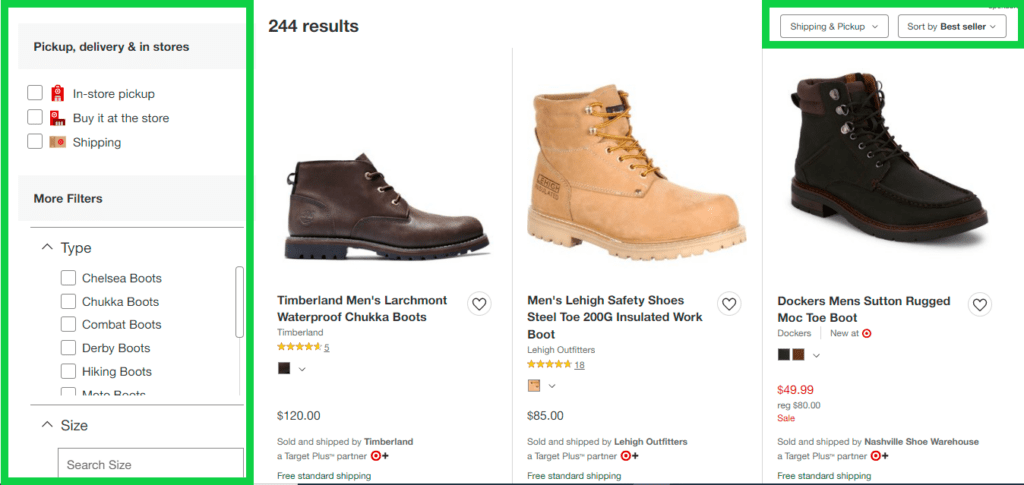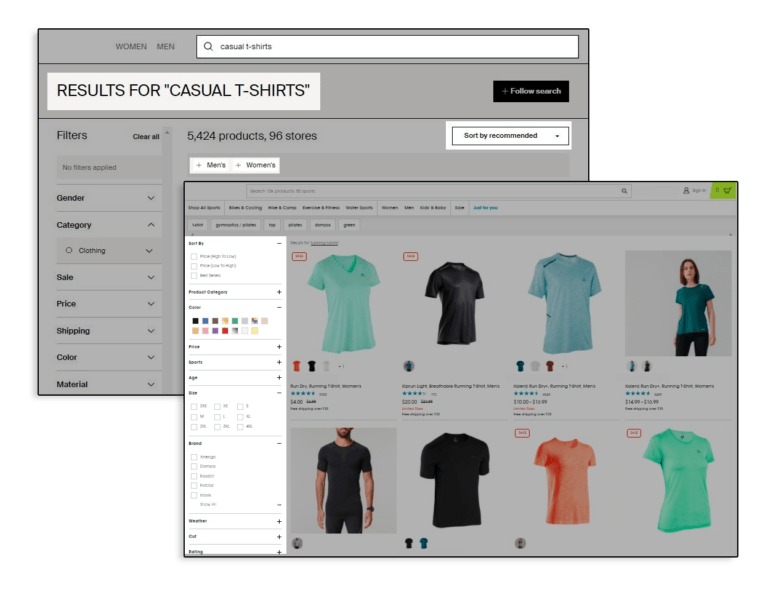It’s no secret that e-commerce store owners know better than anyone, search bars are the backbone of any online business. They are a fundamental point of contact that your potential customers have with your brand. The time and efficiency of filtering and navigation on your website play a significant role in your customer retention rate and bounce rate which are indispensable to the survival of your brand.
Essential Filtered navigation is a prominent website feature that has now become an industry standard for E-commerce websites. Its purpose is to filter large data sets to help the customers reach find what they’re looking for easily and speedily. You use filters in your day-to-day more often than you’d realize, whether is searching for a trendy product on Amazon or looking for a certain playlist on Spotify, or just scrolling through a category of a product on an e-commerce website.

If you want an online store that converts, having filtered navigation is almost essential, not only because it makes navigating the site easier and searching faster, but also because customers are already familiar with it on big e-Commerce websites, especially after the COVID-19 lockdown. The e-commerce filter navigation features are scattered across different apps on the eCommerce platforms or require coding, but with Expertrec you easily get all the features that business your business will need.
A personalized search experience, easy setup, better customer experience with Expertec
The era of personalized search experience
Engage your users with Expertrec’s Personalization every time they interact and increase the chance of conversion for each interaction. Being a small or medium-sized business owner, using different channels to engage with your customer is vital. All of these channels are essential in order to adequately reach your customer across different times, platforms, and for different marketing and sales purposes.
But even if you get everything right, there’s still something missing in the equation that can help you reach your goals faster and make more money in less time: personalization.
Personalization – whether it’s on your website or social media pages — can greatly improve customer engagement and drive more sales.
But how do you personalize content? How do you create custom experiences for users? And what exactly can personalization do for you?
Let’s look at some of the most important benefits of personalizing content for your eCommerce store.
Personalization is at the very core of sales and marketing. It’s what makes us human and allows us to connect with people, products, and brands on a deeply personal level. Personalization is no longer just a “nice-to-have” in eCommerce — it’s expected. In fact, 59% of consumers say they feel frustrated when content isn’t personalized, and 60% say that they’re more likely to buy from a retailer that does personalize their experience.
The most important benefits of personalizing content for your eCommerce store include:
Increased customer loyalty: According to research from Accenture, 85% of consumers are willing to share their data in exchange for relevant educational information, offers, or discounts. As a business owner, the more data you have about your customer, the easier it is to design an individualized shopping experience for the substantial likelihood that customers are going to purchase from your business again and again.
Greater revenue potential: Personalizing your online store will help you increase conversion rates, which will have a major impact on your revenue. This is why companies that personalize their site see an average 19% increase in sales when compared to businesses that don’t utilize this tactic.
Setup Seamlessly
Ecommerce filter navigation can be confusing for entrepreneurs who are just getting started with their first online store. But it’s an important way to improve your products’ discoverability.
Here’s how ecommerce filter navigation works and how you can set it up on your website:
Ecommerce filters are a way of refining search results in order to find the specific product that you want. They’re typically used to narrow down a list of products by attribute; for example, you might use an “Availability” filter to view only items in stock, or a “Price” filter to view items in a particular price range rather than all at once.
There are many different kinds of filters — they’re not limited to just availability and price. You could have color, size, material or any other product attribute as a filter (if your collection is small enough).
Find out more about the easiest setup for your website, no coding required at: Expertrec
The elements of a better customer experience, in one place
Fast search results – Fast is the new forward. When your website loads search results in less than half a second, it becomes a more seamless part of your customer’s journey. By removing the wait, they become more engaged and you’re able to show them more relevant results in the time they want to spend on the page.
An autocomplete feature does exactly what its name suggests: it completes your typed text for you. If you’re tired of having to type out entire words, or even an entire search term, when doing a search on the internet, there’s a better way.
With the Typo-tolerance feature When a user enters a query the first thing Expertrec does is spell checking. It identifies if the query is misspelled and replaces it with the correct version of the word.
Voice search is an important new trend that is growing fast in adoption. Google’s voice search commands a market share of around 35% whereas Amazon’s echo has a market share of 28%. Voice search is growing four times faster than text based searches and this trend is only set to grow. Expertrec is leading the voice search feature in the ecommerce world. Know more about it here.
Product search is a must on an ecommerce website. It provides the user with the ability to navigate to the product they want quickly and efficiently.
Product recommendations helps you provide users with individualized product suggestions based on their past behavior and the behavior of similar users. A game changer in increasing your conversion rate and boosting upselling and cross-selling activities.
It’s important to consider how many options you offer, how easy it is to use and find the filters & facets, and how much time the user is willing to invest on your website. Using filters, users can narrow down the set of products displayed to those that meet specific criteria. This way, they’re able to quickly and easily discover the product that suits their needs best.
Add to cart from search – One of the most important goals for any eCommerce store is to increase sales. Adding items to cart is an important step towards a sale, so it’s always worth thinking of ways to improve this process.




